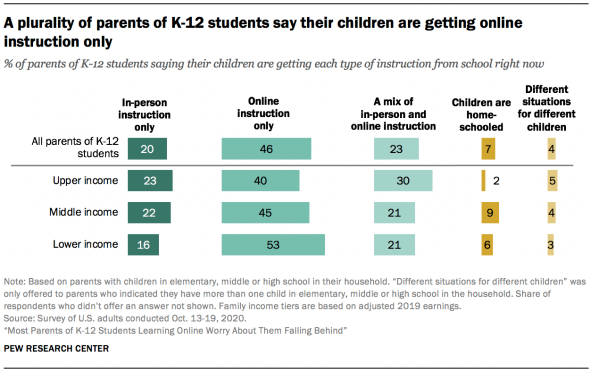(CN) — It’s a no-win situation: parents whose children have been studying at home because of the pandemic are worried about their academics, and parents whose kids have classes in person are worried about exposure to Covid-19.
These are the cheerless findings released Thursday by the Pew Research Center after it surveyed 2,561 U.S. parents of students in K-12 from Oct. 13–19.
Among parents who have kids getting some online instruction, 32% were very concerned their child would fall behind. Only 21% of parents those who have kids back at school getting in-person learning meanwhile shared such concern.
Reacting to the study, Michael Addonizio, a professor of educational leadership and policy at Wayne State University, said parents have every right to worry about their children falling behind.
“Parents' general concern with online instruction is well-founded,” Addonizio said in an email. "Research tells us that online teaching and learning are effective only if students have reliable access to computers and the internet and if teachers have been properly trained to deliver online instruction. Clearly, these requirements were not met when schools abruptly closed back in March and many schools still struggle with their online programs.”
Between masks, social distancing and ventilation, 45% of parents say they are very satisfied with the steps their school is taking to prevent spreading Covid-19. Still, 62% of these parents expressed concern that their children will be exposed at school to the novel coronavirus. Some 20% said they are very concerned about this.
As far as how the schools are handling their children’s education, 54% of parents with kids getting only in-person learning are satisfied with the way schools are handling instruction this fall. But among parents with kids getting online-only education, only 30% were satisfied with the caliber of lessons.
The study also found that lower-income parents are the most concerned about their children falling behind, 36%. Only 19% of upper-income parents are concerned over the same issue.
Addonizio said that parents' concern for their children spreads across all income levels, but noted that upper-income schools and families do have the upper hand.
“For the vast majority of students, online instruction is a poor substitute for classrooms run by skilled teachers. And while the problem is more acute for children from low-income households, it is recognized by parents across the income spectrum,” said Addonizio. “Higher-income school districts enjoy two big advantages here: Their schools have the resources to return to in-person instruction more quickly following the abrupt spring shutdowns, like money for more teachers, smaller classes, deep cleaning, PPE, etc., and to the extent they must continue with some virtual instruction, the schools and households are better equipped to support the effort.”
About 46% said they are supplementing their children’s education beyond what schools are providing. This is mostly seen in parents who have kids doing online-only education, 51%. Only 11% of parents who have kids back in the classroom full time provide a lot of additional instruction.
Some families seek outside help to provide additional instruction to their little ones, but this is mostly in upper-income households. Only 8% of lower-income families have hired out help, where 19% of upper-income families have.
Parents who have kids back at school, online or a mix of both are all rather concerned for the toll the pandemic is taking on their children, the study found.
Specifically, nearly 60% of parents are concerned for their kids’ emotional well-being and their social lives, and 52% of parents are concerned their children are not getting enough exercise.
At the same time, parents with kids doing online only are more worried about their well-being than those with kids getting in-person learning, 63% to 47%.
Parents of preschool-age children are more concerned about social skills their kids may miss out on, 47%, than they are about physical or language skills.
Back in April children made up only 2% of all U.S. Covid- 19 cases, but that went up to 10% when the youngsters started to go back to school, the American Academy of Pediatrics reported back in September.
The Center for Disease Control and Prevention observed a similar spike, noting in a report earlier this month that roughly 56 million children went back to school this fall. The CDC found that rate of teenagers getting infected was double that of younger children. Hospitalizations and death rates were much lower in children as well, according to the CDC report.
Subscribe to Closing Arguments
Sign up for new weekly newsletter Closing Arguments to get the latest about ongoing trials, major litigation and hot cases and rulings in courthouses around the U.S. and the world.









